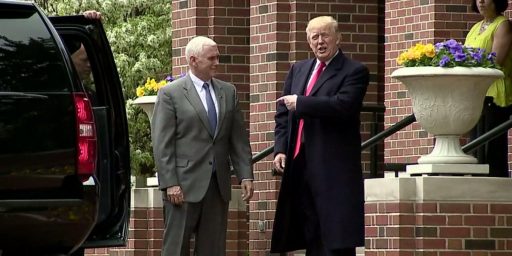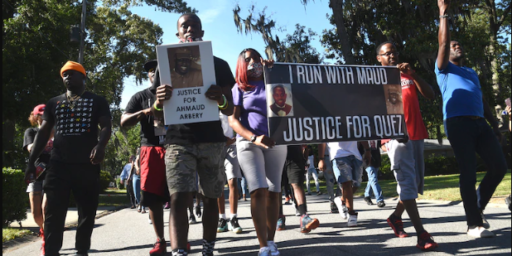The View from Tribeca
A small slice of what people at the epicenter of the Park51 controversy have to say.
 Tribeca (also written as TriBeCa) is the neighborhood in Manahattan where the Park51 community center is to be built.
Tribeca (also written as TriBeCa) is the neighborhood in Manahattan where the Park51 community center is to be built.
The Brian Lehrer Show on WNYC had a call-in segment from people working and living in Tribeca regarding Park51. It is a twelve minute segment and be heard here: click.
It is, at a minimum, interesting to some opinions from persons at the center of the discussion, even if it is just a handful thereof.
Now, the segment proves nothing, as there is the issue of self-selection in terms of likely listeners to a local NPR affiliate and then the self-selection issue of who chooses to call. As Lehrer himself notes in the segment, the process is far from scientific. Still, it is interesting to note that they received no calls in opposition (although the wife of one of the callers was opposed).
This is anecdotal evidence, yet, but it still of use for a couple of reasons.
1) First, it runs counter to the “sensitivity argument” which states that we must be sensitive to the victims of 9/11. Of those who called in, several were present at the time of the attacks, making them victims. Granted, we have no way of knowing how representative these callers of the 9/11 victim community, but if 9/11 was as touchy a subject to the neighborhood as people like Gingrich are making it out to be, one would expect a bit more negativity. It at least says that we do not have the monolith of opposition from victims of the attacks the way some seem to be suggesting.
2) For similar reasons, these calls call into question the “hallowed ground” thesis insofar as it doesn’t sound like at least these particular residents feel the former Burlington Coat Factory in question sits upon “hallowed ground.”
3) The calls do comport, it should be noted, with actual empirical evidence that shows the one place in America (to my knowledge that has been polled) that has majority support (53%) for the project is the Borough of Manhattan: click.
I still find it rather remarkable that the closer we get to the epicenter of the controversy, the less controversial it appears to be to the people located there.






Using samples from a NPR station and a New York liberal arts College poll, keep reaching.
Did you read the post?
“Did you read the post?”
It wasn’t biased to Wayne’s satisfaction, so no…..
Yes
You recognize that your evidence is weak or at least anecdotal. Yet you went on and treated it almost as if it was solid and base your conclusions on them.
It is odd for someone knowing the accuracy of their assumptions is very much in question yet continue to have a strong belief in their accuracy. As well as having strong conviction on their conclusions base on shady assumptions.
Ultimately you may be right and then again maybe not. However treating things as fact simply because you want it to be fact, well you can finish the rest. You have seemed somewhat reasonable in the past.
Then again maybe I not taking enough time to read it more carefully and maybe you are trying to be sarcastic. Whatever, I am just throwing my thoughts out there on my quick read of your post.
For Christ’s sake, Wayne, this is what Steve wrote:
” Granted, we have no way of knowing how representative these callers of the 9/11 victim community, but if 9/11 was as touchy a subject to the neighborhood as people like Gingrich are making it out to be, one would expect a bit more negativity. It at least says that we do not have the monolith of opposition from victims of the attacks the way some seem to be suggesting.”
That seems a fair conclusion of the basis of the interviews, don’t you think?
Hey Wayne, I would say that NPR callers and the the results of a poll by a New York liberal arts college are definitely relevant (small sample size aside), since Manhattan is a very liberal city. You think there are a lot of neocons in Manhattan?
“we have no way of knowing how representative these callers” followed by
“It at least says that we do not have the monolith of opposition from victims of the attacks”
Anybody took basic logic. Those two statements do not belong together in a logical statement. You can’t logically say that you don’t know how representative your sample is but then draw a firm conclusion from it. Also you shouldn’t mix you groups up.
Yes Manhattan is a very liberal city but they are not the only victims of the attack. A person living in Manhattan doesn’t even mean they were more directly affected than someone else. Regardless the samples taken are not very reliable indicators.
One can’t justifiably say something is a fair conclusion when the premise and\or assumptions are known to be likely flaw. Now one can say “hypothetical if this is true then such and such is a fair conclusion”. However that is not what happen.
Perhaps Steven meant “monolith” as meaning almost everyone. Then he would be correct but he has been talking about people who are in opposition. I haven’t heard any of those people make such a all conclusive claim.
Well, Wayne, I took basic and advanced logic courses, and taught logic. So, here goes:
If you have a statement that says All Xs are Ys, but then you come across cases of Xs that are not Ys, the simple inference is that it’s not the case that all Xs are Ys. Which is pretty much what Steve was saying. He doesn’t have to know “how representative” the sample was, only that the folks involved lived in Tribeca, and some of these folks are not opposed to the mosque. Therefore, the statement ‘All who live in Tribeca are opposed to mosque’ (I.e., the purported “monolith”) is false. He wasn’t talking about all of Manhattan. btw.
Wayne apparently doesn’t understand the meaning of the word “monolith.” Not surprising.
Perhaps Steven meant “monolith” as meaning almost everyone.
Perhaps!
mon·o·lith –noun
something having a uniform, massive, redoubtable, or inflexible quality or character.
I bolded the relevant part for you.
Here’s another one you may want to check out:
dic·tion·ar·y –noun
a book containing a selection of the words of a language, usually arranged alphabetically, giving information about their meanings, pronunciations, etymologies, inflected forms, etc., expressed in either the same or another language; lexicon; glossary
No real surprise here. New Yorkers are some of the most sophisticated people in the country, thus they are not likely to outsource their thinking to Fox & Friends.
Go back and read what I said about the word “monolith”. As I said if Steven meant the literal meaning of the word as in “almost all” He would be correct in his statement from a literal interpretation.
However if he did mean “monolith” literally and not as an artistic exaggeration for impact then he grossly misstated and\or lied about what the opposition position was. IMO he was using an exaggeration and meant it as “significant majority”. Maybe I am wrong and he was lying. Either way I cover it . Once again go back and read my statements.
To recap in the one case he is wrong and\or lying in his representation of the opposition position and in the other case he is wrong in the logic.
Assuming that he wasn’t misrepresenting or lying about the opposition position, he stated that all of y = x when x = (small and unknown representative subset of Y).
Did anyone think he really meant monolith as meaning all? Does anyone think the opposition thinks absolutely everyone is against it?
Wayne, the word ‘monolith’ in ordinary discourse means ‘without exception’. But beyond that, it’s really unseemly for you to accuse Steve of lying, or even intimate that he’s lying, in order to save your failing argument.
On the logic part, dude, you’re just flat wrong, as I showed.
Sam
Do you really think that Steven meant to claim that the opposition is saying “every single person is in opposition”?
Unless he did then you logic argument falls flat.
If he did mean it that way, please explain how that is not a gross exaggeration, lie, or idiotic statement. Please don’t give me “he said “some” which may be some people he talk to on the corner”.
Did you read the part of one of my early comments that followed my statement “Perhaps Steven meant “monolith” as meaning almost everyone”?
One more thing. When I have seen the word “monolith” it has meant massive not without exception. “Without exception” means not even one case to the counter. Uniformity and massive can have several cases to the counter but as a whole still be uniformed and\or massive.
Before someone sharp shoots me I meant to say ”usually when I have seen the word “monolith””.